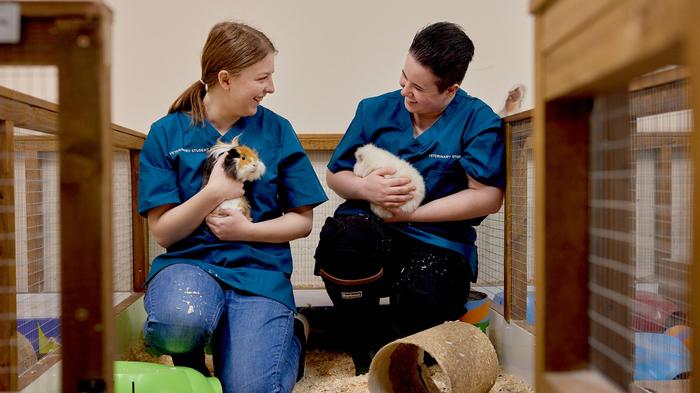Harper Adams University Launches New Two-Year Course to Support Aspiring Vets
A new two year accelerated Veterinary Bioscience degree programme has been developed by Harper Adams offering a faster route of progression to graduate entry Veterinary Medicine programmes.
This programme may also be one that appeals to those unable to commit to a three- or four-year degree programme that do not wish to progress onto Veterinary Medicine.
The BSc (Hons) Veterinary Bioscience (Accelerated) programme, launched for 2024 entry, has places available in Clearing.
Using the award-winning facilities on the Harper Adams Campus – including its laboratories, Companion Animal House, and the University’s Future Farm – the course aims to equip its students with the scientific grounding needed to progress onto Veterinary Medicine or, if desired other animal related areas. With a focus on animal biology and physiology, students will gain a key understanding of health and diseases in animals.
Subjects studied include, but are not limited to: nutrition, biotechnology, microbiology, disease science, pain biology and management, and disease control.
Head of Department, Jane Thomas, said: “This course has been developed with the specific aim of providing the scientific grounding and work experience needed to support graduate entry into Veterinary Medicine courses – however, it can also open a wide range of career opportunities should the student wish.
“Primarily this degree programme is here for those that do not meet the entry requirements to progress directly onto Vet School.
“This course builds on our successful delivery of undergraduate and postgraduate courses in veterinary and animal-related subjects, working with such partners as the Royal College of Veterinary Surgeons (RCVS), Animal Medicines Training Regulatory Authority (AMTRA), Veterinary Medicines Directorate (VMD), National Office for Animal Health (NOAH) and the Animal Behaviour and Training Council (ABTC).”
Jane added: “For students who are intending to go on and study Veterinary Medicine, this course will work with you to identify and complete work experience requirements needed for entry to those programmes.
“For those not wishing to take this route, it will see you develop career goals and define the experience needed to progress in your chosen industry following graduation.
“While it is important to note that by studying this course you will not qualify as a vet and be able to diagnose and treat animals, it is here to help you with the knowledge you need both to progress to Veterinary Medicine through the graduate entry route, or to explore the whole host of other careers and opportunities a Veterinary Bioscience degree offers you.
“If you’re interested and think it could be for you, do get in touch with us to chat things through!”

